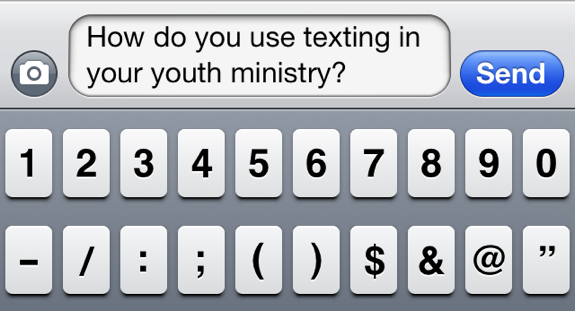Texting in Youth Ministry
 [This post is a part of the Technology in Youth Ministry series]
[This post is a part of the Technology in Youth Ministry series]
If you want to communicate with your students, e-mail is old fashioned and you'd be crazy to think that they would actually visit your website. If you work in youth ministry, you have no surprise hearing that teenagers like text messaging. In fact there are often very few moments when you can find teenagers apart from their cell phones. Because of the reality of this, texting can be a great opportunity for you to communicate with your students, keep in touch with individual students, and encourage spiritual growth.
Find Opportunities to Utilize Texting
Mass Communication. One of the simplest ways to utilize texting is in some form of mass communication. This would be if you are looking for opportunities to send a mass message to your entire youth group to remind them of an upcoming event, program, or even simply to get them thinking about the upcoming topic for bible study. Mass texting can be incredibly effective because students always have their phones with them; just don't spam people with too many or unwanted text messages.
Individual Communication. Since students like to use their phones for communication, sending an individual message to a student can be a great way to keep in touch or encourage a student throughout the week. I prefer to avoid texting conversations with students, but I love to occasionally send a student a message that encourages them by saying, "Hey dude, just wanted you to know I'm praying for you today!"
Texting Campaigns. This might fit into a form of mass communication, but I still choose to categorize it differently. Where mass text is trying to communicate the details of a program, a campaign has some sort of spiritual emphasis in mind. This might be a campaign where you send a daily or weekly scripture reading to a group of students or a campaign to encourage students to be praying for something every day. The difference with this over a typical mass message is that the goal is not reminding a student of information, but instead encouraging them to live out a key component of their faith.
Set Healthy Boundaries
Because texting is a very personal medium for communicating with students and is something they'd happily do at any hour and in any situation, it is very important that as a leader or volunteer in the ministry you set very clear boundaries. Healthy boundaries will help protect you and your relationships with students, students' parents, and your own family.
It's important to not create a situation where you can be texted at any hour of any day, it's important to not put yourself in compromising situations with the students that you are texting, and it's important to always remain above reproach.
Some possible boundaries:
- Don't text students after 8pm.
- Don't text students of the opposite sex.
- Let someone know as soon as you get a text that makes you uncomfortable.
- Utilize a service with a texting that doesn't use your personal phone number like Google Voice.
- Make sure your spouse is okay with who and when you're texting.
What opportunities to you use for texting students? What boundaries have you set?